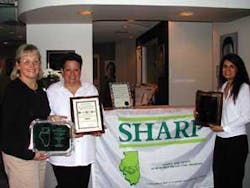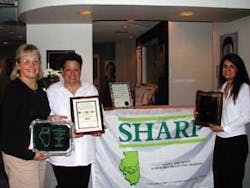The power of three
by Elly Vazirnia
The success of teamwork is in mastering the BLT. I first heard this phrase in a seminar given by Dr. Jimmy Eubank. It means "believable, likable, and trustworthy," which all comes with practice, compassion, and commitment. Knowing what is best for our patients comes with knowledge and dedication. This is achievable when a hygienist takes the leading role in her profession and shows, as a member of the dental team, that she is playing her role in leading and welcoming changes in her profession.
As a new graduate in 1994, I started my career in a general practice with three dentists sharing an office space. Each one had one or two dental hygienists to work on their team. I observed much competition among staff members, including among all of the hygienists. Patients constantly switched from one doctor to another, and the comments from the staff members were uncomfortable and sometimes hurtful. Although we were all paid hourly, and no commissions were received, the atmosphere was not friendly.
In 1999, the oldest dentist retired and the youngest one took over. We began to see many changes within the practice. Recently, the three remaining hygienists in the practice came together to take charge of the hygiene department. We welcomed new technology and experienced the power of teamwork.
Lois, who is 62 years old, has been a hygienist for 20 years. She is still as motivated as when she first came out of hygiene school. As doing the math will tell you, Lois started her career at age 42. She feels the main reason she still loves dental hygiene after all these years is because she is valued by her peers and has the love and trust of her patients.
Angie has been practicing for 26 years, and she plans to keep working until retirement. Before Angie came to this office about six years ago, she had worked in many different offices. She is now certain that this will be her last time to look for a position; she is thrilled to be part of a hygiene team that works together for the good of the patients and supports one another no matter what.
I am Elly, the "newcomer." I practiced for nine years as a dental hygienist and the prior 10 years as a dental assistant, sterilization technician, and at the front desk.
In 1999, I was offered a position as an OSHA coordinator. I accepted the position and had the opportunity to take continuing education classes and training in order to understand OSHA regulations and to be able to train staff members properly. When my training was completed, I put together a program for our organization. The program addressed the changes that were necessary in order to comply with OSHA regulations.
I worked hard and spent a lot of hours putting the program together, and I assumed that I would have the support of the staff, particularly since this was an additional responsibility in conjunction with my existing position as a dental hygienist.
Although my experience as a dental hygienist required various communication skills with patients, this was the first time I had to lead a diverse group of staff members from different cultures. When I introduced the changes and acted as the authority behind the safety regulations, I certainly overlooked the value and importance of positive cultural communication skills. I was so focused on the task and eager to get it done correctly and in a timely manner that I did not consider the staff's reaction or seek their feedback.
Safety made common sense to me, and I was very confused by the resistance and the ignorance I was witnessing. The harder I tried to make the staff understand and value the importance of safety, the more miserable I became as I felt the tension and segregation among the staff members.
I then decided to get some training in supervisory skills. I loved all of the learning and growing, but I have to admit that this did not make a difference in how I was being treated or heard. Looking back on the experience, I know that the staff was not ready for all of the changes. Some members of the staff have been with the organization for a long time, and they felt overwhelmed by the new changes and goals.
The culture also played a major role. I had challenged myself with the opportunities that were offered to me and wanted to take advantage of the education and technology. On the other hand, the veteran members of the staff felt comfortable and did not want any changes. This resulted in confusion for the new staff members, as well as frustration within the office.
Eventually, I turned to my dental hygiene colleagues and asked for their expertise and support. I learned that the conflict was due to the belief that everyone was not being treated fairly and equitably. As a team, it is important to understand that we are all part of the problem and the solution. I learned a great deal about the importance of communication skills, involvement of staff, acknowledgement of their work, and beliefs and value of people.
In order to be effective and efficient, I had to stop and ask for help. This is why I turned to Lois and Angie. With their help, the office received its first OSHA award in 2000. We created a system in which we could deliver care as a team that guided our patients with their oral health. We took many continuing education courses as a team, which was supported and paid for by our dentists. We shared ideas and respected our differences. This effort placed our hygiene department as a valuable asset to the practice.
Our involvement in the SHARP (Safety and Health Achievement Recognition Program) has won our office a couple of awards from the Department of Commerce and OSHA. Our office became the second dental practice in the state of Illinois to be granted this award.
Patients started to see us from a different perspective — delivering care with the highest quality. These actions became important in our patient/professional relationship, and they put the hygienists in charge of our careers. The dentists were supportive and trusted our judgments, especially when the outcome was success, trust, and full daily schedules.
Hygienists need to trust their abilities in playing a role within the profession to get the recognition and trust we deserve.
This can only be done when we take charge in our profession, respect other team members, and put patients' needs first no matter what. We can start by treating each other as professionals to share ideas. Only then can other team members follow. This requires work, commitment, and involvement. We discovered the power of three when we used the BLT, and we let it lead us on the road to success.
Elly E. Vazirnia, RDH, practices clinical dental hygiene at the Arlington Dental Group in Arlington Heights, Ill. Born and raised in Iran, she has lived in the United States for the past 20 years. Vazirnia will finish her work on a bachelor's degree from the University of Saint Francis this summer. She is currently participating in a pilot program for sealants at Northwest Community Hospital in Arlington Heights. She can be contacted at [email protected].

